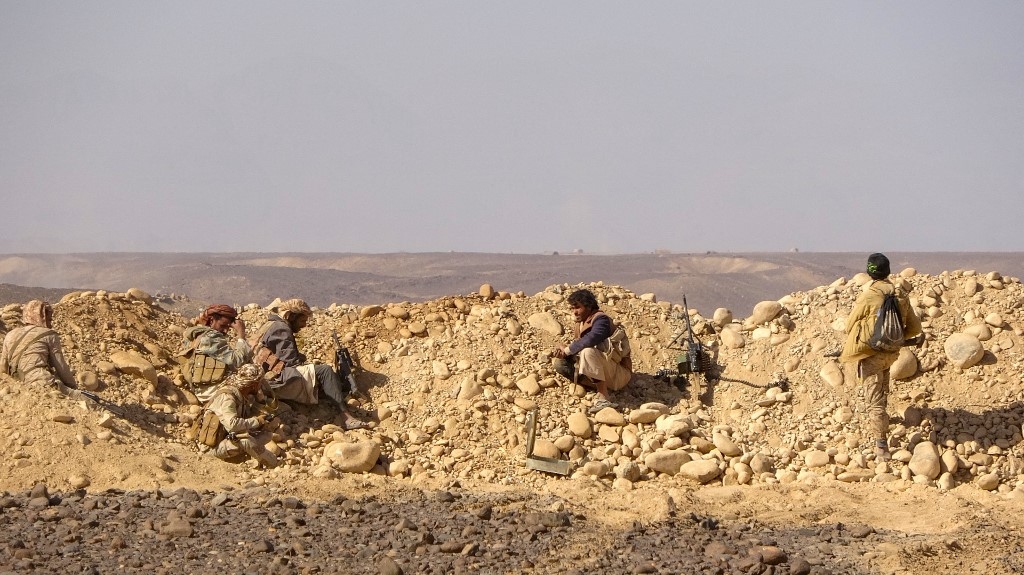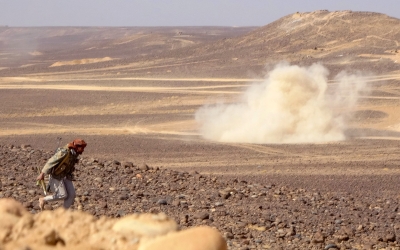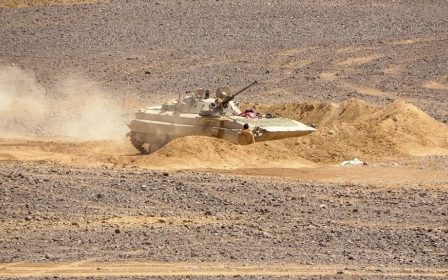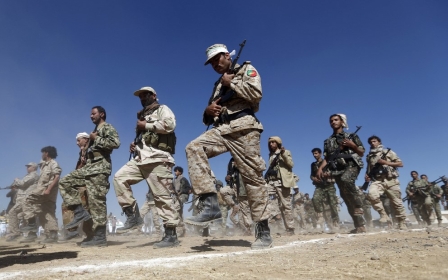US urges Yemen's Houthis to join peace talks, stop assault on government stronghold

The United States has called on the Houthi movement in Yemen to stop its attacks on the government's northern stronghold of Marib, and instead "turn to negotiations" in order to settle a peaceful solution to the conflict.
In a statement on Tuesday, the US State Department urged the Houthi movement to end its attacks on Marib, an area in northern Yemen controlled by the internationally recognised government.
Dozens of Houthi and government troops were killed in the area over the weekend, as the rebels intensified attacks in an attempt to seize the oil-rich region, 120km east of the capital Sanaa.
'The time to end this conflict is now. There is no military solution'
- US State Department
The city's loss would be disastrous for Yemen's beleaguered leadership. In addition to its oil fields and its Safer oil refinery, Marib is a key producer of natural gas, supplying the entire country.
The Houthis have been poised to take the province since early last year, but the State Department is concerned that such an action would take the warring parties in Yemen further away from establishing any sort of peace accords.
New MEE newsletter: Jerusalem Dispatch
Sign up to get the latest insights and analysis on Israel-Palestine, alongside Turkey Unpacked and other MEE newsletters
"The Houthis' assault on Marib is the action of a group not committed to peace or to ending the war afflicting the people of Yemen," the State Department said.
"Marib is controlled by the legitimate government of Yemen. This assault will only increase the number of internally displaced persons and exacerbate the humanitarian crisis in Yemen, already home to the world’s worst humanitarian catastrophe," the department continued.
'Unimaginable consequences'
The battle for Marib is the latest development in a protracted conflict between the Houthi movement and a western-backed, Saudi-led coalition that intervened in Yemen in 2015 to reinstate the government of Abd Rabbuh Mansour Hadi.
Mark Lowcock, the UN undersecretary-general for humanitarian affairs, also on Tuesday warned that the assault on Marib endangers two million civilians and could cause hundreds of thousands to flee the city, "with unimaginable humanitarian consequences".
"Now is the time to de-escalate, not to add even more to the misery of the Yemeni people," Lowcock said in a series of posts to Twitter, adding that he would be briefing the UN Security Council about the situation on Thursday.
One of the first foreign policy issues tackled by the new administration of US President Joe Biden, the United States has made ending the war in Yemen via diplomatic negotiations a top priority.
"If the Houthis are serious about a negotiated political solution, they must cease all military advances and refrain from other destabilizing and potentially lethal actions, including cross-border attacks on Saudi Arabia," the State Department stressed in Tuesday's statement.
'Time to end this conflict is now'
Saudi Arabia has invested heavily in Marib in recent years, and the Saudi-led coalition has intensified air strikes to stop the rebels from seizing the city.
The Biden administration announced plans to end US support for the Saudi-led offensive and halted some weapons sales to Riyadh as part of a major reset in foreign policy shortly after taking office in January.
The administration also removed the last-minute terror designation that had been levied against the Houthi movement in the final days of the Trump presidency, but has since continued to strongly censure the group for escalating attacks against Saudi Arabia.
The State Department said that the Houthis, officially known as Ansar Allah, "must commit to constructively participate in the UN-led political process and engage seriously in the diplomatic effort led by [the US]".
The main reason for lifting the terror designation was to ensure humanitarian work in Yemen is unimpeded and to pave the way to restart peace talks.
"The time to end this conflict is now," the department said. "There is no military solution."
Despite opposition to the Marib offensive, US State Department spokesman Ned Price defended the US administration's decision to revoke the Houthis' terror designation, highlighting humanitarian aid groups' opposition to blacklisting the Yemeni rebels.
"We do not have second thoughts about the profound humanitarian implications that were at play when it came to the broad designation of Ansar Allah," he said on Tuesday.
Yemen's drawn-out conflict has killed nearly 250,000 people and displaced millions, sparking what the UN calls "the world's worst humanitarian crisis".
On Friday, UN agencies warned that about 400,000 Yemeni children aged under five were in danger of dying of acute malnutrition this year.
The agencies also warned that about 1.2 million pregnant or breastfeeding women are expected to suffer from extreme malnutrition in 2021.
'International pressure'
Later on Tuesday, Timothy Lenderking, US envoy for Yemen, also slammed the Houthi advance on Marib and underscored that the city is home to a large population of internally displaced people.
"Unless and until the Houthis change their reprehensible behaviour, their leaders will remain under significant US and international pressure," Lenderking told reporters on Tuesday.
'The Houthis must truly commit to join this effort to finally ending the suffering and this war'
- Timothy Lenderking, US envoy for Yemen
The American diplomat reiterated American support for the UN-led peace process, urging the Houthis to push towards finding a peaceful resolution to the conflict.
"The Houthis must truly commit to join this effort to finally end the suffering and this war," he said. "Ending this war through a lasting political solution is the only means to durably end the humanitarian crisis that is devastating the Yemeni people."
Asked about Biden's decision to end US support for Saudi offensive operations in Yemen, Linderking acknowledged that the details of that announcement are "still being discussed".
"The president made a firm commitment; we are abiding by that," he said. "At the same time, he and the Secretary [of State Antony Blinken] have both made clear that we're not going to allow Saudi Arabia to be target practice. Saudi Arabia needs to have the ability to defend itself."
Middle East Eye delivers independent and unrivalled coverage and analysis of the Middle East, North Africa and beyond. To learn more about republishing this content and the associated fees, please fill out this form. More about MEE can be found here.





